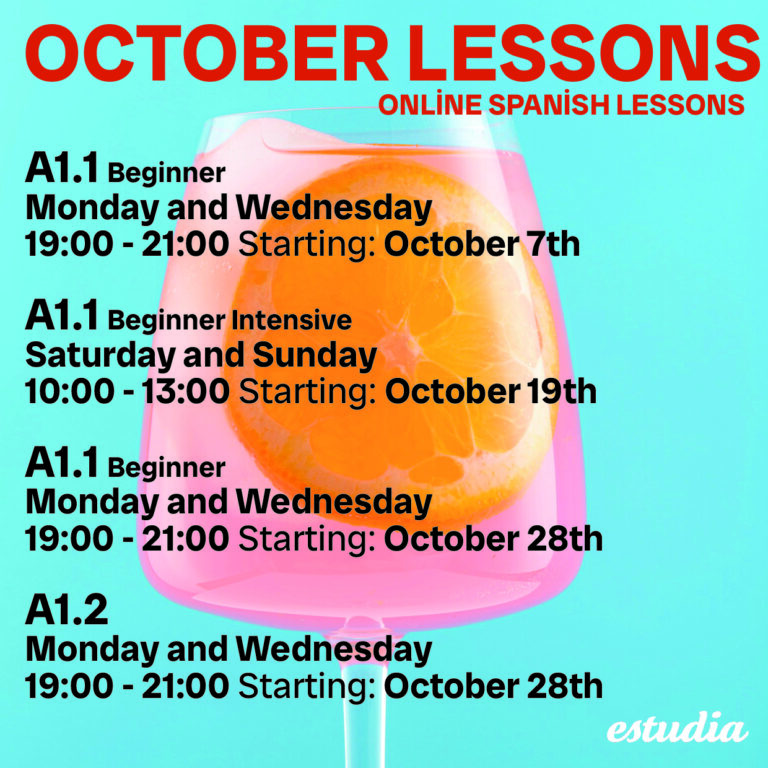Preparing for Spanish Exams: DELE and SIELE Success Strategies
Preparing for Spanish proficiency exams like the DELE (Diplomas de Español como Lengua Extranjera) or SIELE (Servicio Internacional de Evaluación de la Lengua Española) involves a deep understanding of the exam’s structure and format. These exams assess comprehensive language skills, including reading, writing, listening, and speaking. Utilizing recommended resources such as official guides and online tests is crucial. At “Estudia,” we provide expert training with native teachers, helping you excel. Effective time management and relaxation techniques on the exam day can significantly enhance performance.
1. Understand the Format
Understanding the specific format of your exam is crucial. Each exam part, whether reading, writing, listening, or speaking, has its own set of rules and types of questions. Familiarity with these details allows for targeted practice, reducing stress and optimizing study sessions. Delve into the exam guidelines provided by the official websites to grasp the expectations and evaluation criteria thoroughly.
2. Practice with Past Papers
Regular practice with past exam papers is vital. It helps not only in familiarizing yourself with the question types but also in understanding the scoring system. By simulating the exam conditions, such as timing yourself during these practice sessions, you can improve your time management skills, ensuring that you can complete all sections within the allotted time on the actual exam day.
3. Engage in Active Listening
Active listening involves more than just hearing words; it requires full engagement with the audio material to improve comprehension and retention. Include a variety of content in your listening practice, such as Spanish radio shows, movies, and TV series, to expose yourself to different accents and slang. This diversity will enhance your ability to understand spoken Spanish in various contexts and under different conditions.
4. Expand Your Vocabulary
A broad vocabulary is essential for success in any language exam. Read extensively across multiple genres and topics to encounter a wide range of vocabulary. Creating flashcards and using digital tools to review these words regularly can help in long-term retention. Additionally, focus on thematic vocabulary that is often part of the exam’s content, such as terms related to business, health, or travel.
5. Master Writing Conventions
Developing strong writing skills requires consistent practice. Write regularly on a variety of topics and in different formats, adhering to the stylistic and structural norms of Spanish. Engage in peer review sessions where you can exchange writings with classmates to receive constructive feedback. Utilize online forums or language learning communities to get additional feedback and tips from fellow learners and native speakers.
6. Simulate Speaking Scenarios
To enhance your speaking skills, create realistic speaking scenarios that mimic the exam environment. Engage in conversations with native speakers or fellow learners, focusing on articulation and fluency. Participate in language meet-ups or online exchange programs that provide opportunities to discuss a wide range of topics, helping you become comfortable with spontaneous speaking and improving your ability to think and respond in Spanish.
7. Review Key Grammar Points
Grammar is often the backbone of language proficiency exams. Dedicate significant study time to mastering complex grammatical structures. Utilize exercises that reinforce the application of grammar in real-life scenarios, which helps in solidifying the rules and their usage. Online platforms and traditional grammar books can provide structured practice and explanations.
8. Join Study Groups
Being part of a study group can be extremely beneficial. It allows for collaboration and sharing of resources, making the preparation process less isolated. Study groups can also motivate you to maintain a regular study schedule. Engaging with peers facing similar challenges fosters an environment of mutual support and collective problem-solving.
9. Test-Day Strategy
On the day of the exam, come prepared with a clear strategy. Start by quickly scanning through the exam to gauge the difficulty of different sections and plan your approach accordingly. Prioritize tasks that you find more manageable to build confidence early on. Manage your time effectively, ensuring you allocate enough time to each section without rushing through the questions.
At “Estudia,” we specialize in preparing students for rigorous Spanish proficiency exams like DELE and SIELE. Our comprehensive courses are crafted by experts to ensure thorough preparation in all aspects of the exam, including reading, writing, listening, and speaking. We offer a robust selection of resources and expert guidance to optimize your study experience.
Our instructors, native speakers with extensive teaching experience, provide insights not only on language mechanics but also on effective exam strategies. This dual focus ensures that you not only master the language but also excel in the specific challenges presented by these exams.
Joining “Estudia” allows you to access a supportive educational environment where you can pursue your Spanish language goals and maximize your potential. We are committed to helping you succeed and invite you to be part of our learning community where excellence is the standard.






